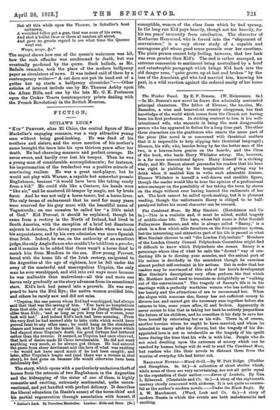The Combined Maze. By May Sinclair. (Hutchinson and Co- 6s.)—This
is a realistic and, it must be added, sordid tragedy of middle-class life. The hero, whose full name is John Randall Fulleymore Ransom°, and who is always called "Benny," is a clerk in a firm which sells furniture on the hire-purchase system, but the interesting and attractive part of his life is pas3ed in what Miss Sinclair chooses to call "the London Polytechnic." Members of the London County Council Polytechnic Committee might find it difficult to know which Polytechnic she means. Benny is a personage whose idea of what he calls the "decent" way of con- ducting life is to develop your muscles, and the animal part of his nature is decidedly in the ascendant though he exercises almost perfect self-restraint in his actions. But in order that ber readers may be convinced of this aide of her hero's development Miss Sinclair's descriptions very often perform the feat which Mr. Matthew Arnold used to translate so delightfully as "walking out of the conveniences." The tragedy of Ranny's life is in his marriage with a perfectly worthless woman who has nothing but her beauty and the attractions of sex to recommend her. When she elopes with someone else, Runny has not sufficient money to divorce her, and cannot get the necessary sum together before she returns to him, some years after, ill and broken. Apparently it never occurs to him that in taking her back he entirely jeopardizes the future of his children, and he considers it his duty to save her from herself by reinstating her as his wife. There is, of course, another heroine whom he ought to have married, and whom ho intended to marry after his divorce, but the tragedy of his dis- appointed love is not so intolerable as the tragedy of his spoilt home during the time that his wife is with him. People who do not mind dwelling upon the extremes of misery which can be reached by human beings will do well to read The Combined Maze, but readers who like their novels to distract them from the worries of everyday life had better not.


























































 Previous page
Previous page